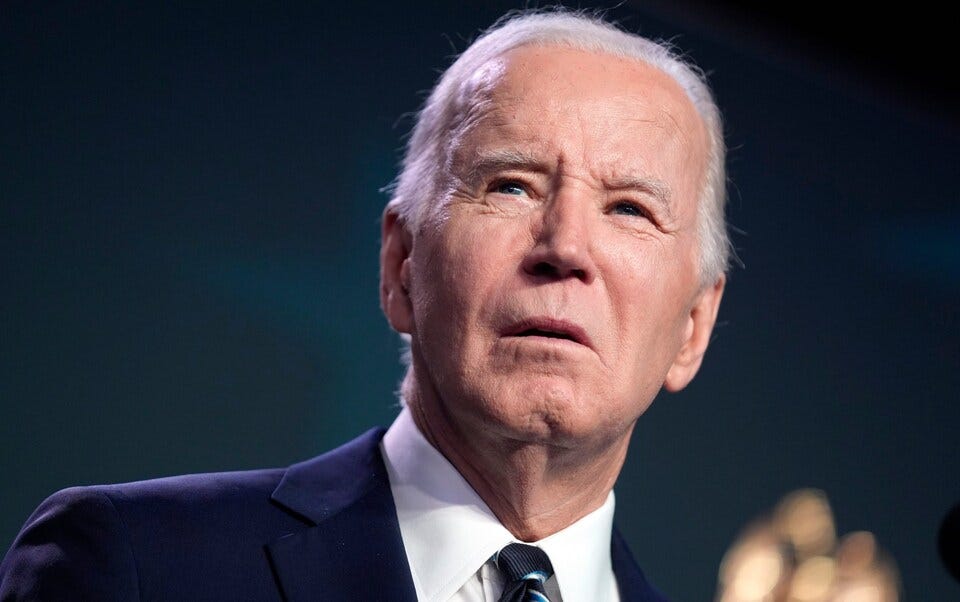He was sweet and well meaning, but he was old. He was hazy. His memory was poor. Doddering, confused, the self-proclaimed leader of the Free World seemed ready to check into a retirement village. That, at least, is the thick insinuation of the Special Counsel’s report on President Joe Biden’s mishandling of classified documents when vice president during the Obama administration.
The findings of the Special Counsel Robert Hur were not punitive. But they were laceratingly wounding. It seemed to resemble more of a nurse’s assessment of whether you need an upgrade in aged-care treatment, a bolstering of services for a person in declining years. (“Have you lost your mind, dear?”)
During the course of the investigation, things did not get better. “In his interview with our office, Mr. Biden’s memory was worse. He did not remember when he was vice president, forgetting on the first day of the interview when his term ended (‘if it was 2013—when did I stop being Vice President?’), and forgetting on the second day of the interview when his term began (‘in 2009, am I still Vice President?’).”
At an ill-tempered press conference, Biden insisted that his memory was “fine,” that Hur should never have asked such questions as whether the president could recall when his son died and that he was “well meaning. And I’m an elderly man. And I know what the hell I’m doing. I’ve been president—I put this country back on its feet.”
The picture is not a good one. But then again, when was it? Prior to coming to power, Biden already had a bookshelf list of bungles, gaffes and misjudgements. The only question looming behind was the degree of intent behind them. In 1987, he notoriously plagiarised much of a speech by the then leader of the British Labor Party, Neil Kinnock and, to show he was on a hot streak, generously decorated his academic record from Syracuse Law School. Despite describing this as “much ado about nothing,” he withdrew from the contest for the Democratic presidential nomination that September.
His campaign team, terrified that he might verbally snare himself leading up to the 2020 election, tried their best to insulate him from penetrative public scrutiny. This was very much aided by the ravages and restrictions of the pandemic, which afforded him the perfect excuse to operate in conditions of masked isolation.
As commander-in-chief matters have only worsened. Figures, for example, were airily revised—a million dead US residents and citizens from the ravages of COVID-19 became the somewhat reduced figure of “over 100.” World leaders dead or alive were swapped in Biden’s memory channel—a flattering form of death revival, and a denigration of the living. Biden, for instance, confused the current French president, Emmanuel Macron, with the late François Mitterrand before a campaign rally in Las Vegas.
His geographical recall was not too good either. “Right after I was elected, I went to a G7 meeting in southern England. And I sat down and said, ‘America is back!’ and Mitterrand from Germany—I mean France—looked at me and said, ‘How long are you back for?’”
In terms of wars, he has remarked that Russia’s Vladimir Putin was “losing the war in Iraq,” which would have surprised the Russians, Ukrainians and everybody else. More could have been made by the Republicans about this in Congress, but then again, their aged warriors are hardly endowed with brainbox memories of sound recall or cognition either.
Other mishaps could cause titters of amusement—the harmless, dotty chap who muddles the facts, lighting up pub conversation. During his April visit to Ireland last year, light entertainment was caused by his confusion between the terroristic Black and Tan enforcers during the Irish War of Independence (1919-21) and the All Blacks, New Zealand’s fabled rugby team. The remarks were made in Louth in the context of speaking about a former rugby player and distant cousin Rob Kearney. “He beat the hell out of the Black and Tans,” an admiring Biden recalled.
The more significant, and dangerous problem is that a decaying, eroding memory can become the perfect pretext of making appalling policy even as it is forgotten, a form of erasure as things are being done. Policies long pursued and understood can be given the heave-ho. Biden’s belligerence over the Taiwan question, and whether a war over the province with China would be worthwhile, is a case in point.
Biden’s opponent does not, oddly enough, have that problem. Donald Trump, even at 77-years of age, has a habit of transmuting inability to faux talent. One never knows whether his confusions are intentional in their malice or genuine acts of indifference or imbecility. (He very intentionally forgot the existence of WikiLeaks after the 2016 election, despite lauding the organisation’s press achievements prior.) More recently, competing Republican contender Nikki Haley got switched with Democrat veteran Nancy Pelosi. Petulant, hysterical, and stubbornly adolescent, he has a form of counterfeit youth on his side, the child in rompers who always screams even after downing the milk. When he errs, he is not only forgiven but given candied approval by his understanding supporters.
What matters now is the sense that the errors and lapses have arisen because of Biden’s age, the causal attribution to worn memory that renders the ruling magistrate enfeebled and vulnerable to overthrow. The campaign trail till November 2024 will be long and vicious, and Biden’s team may well have to reprise their role as quarantine specialists for their leader. In the meantime, best consult the RAND Corporation study about the risks posed by dementia afflicting the US imperium’s aged security and intelligence community. It promises to only get worse.




